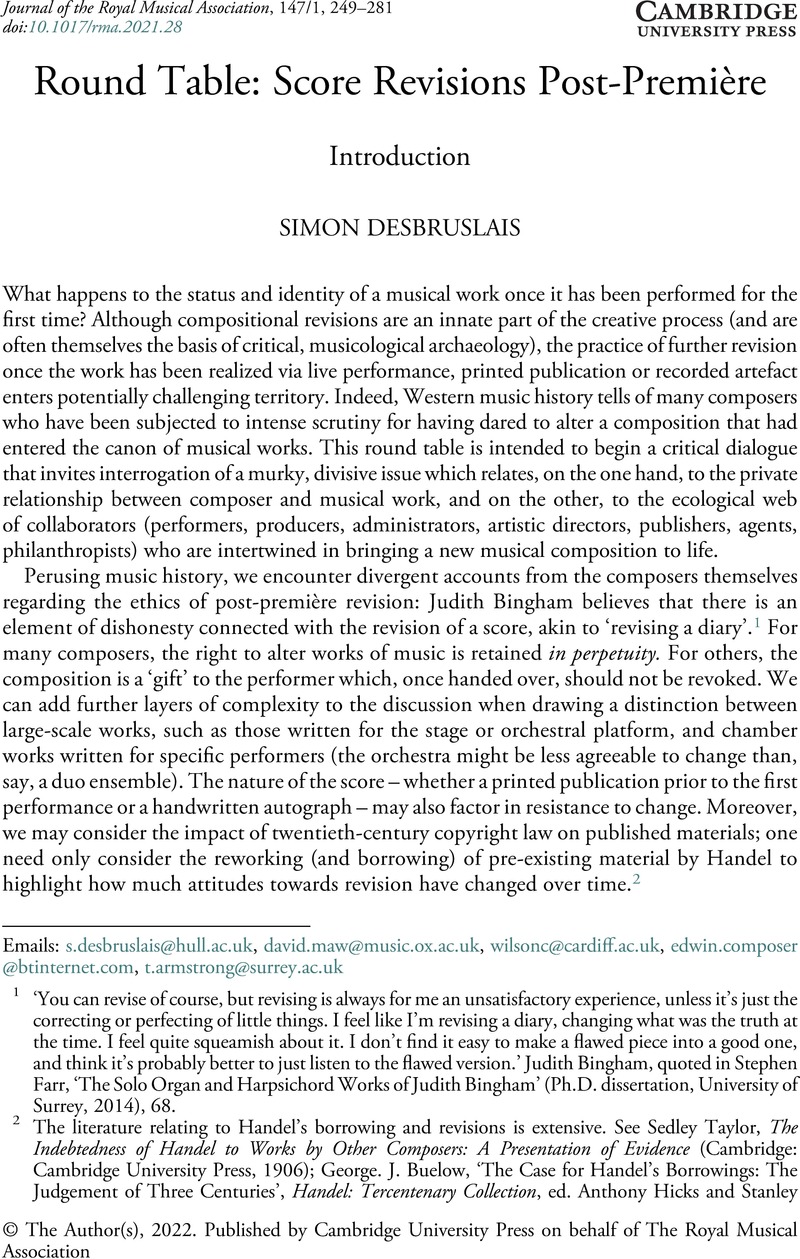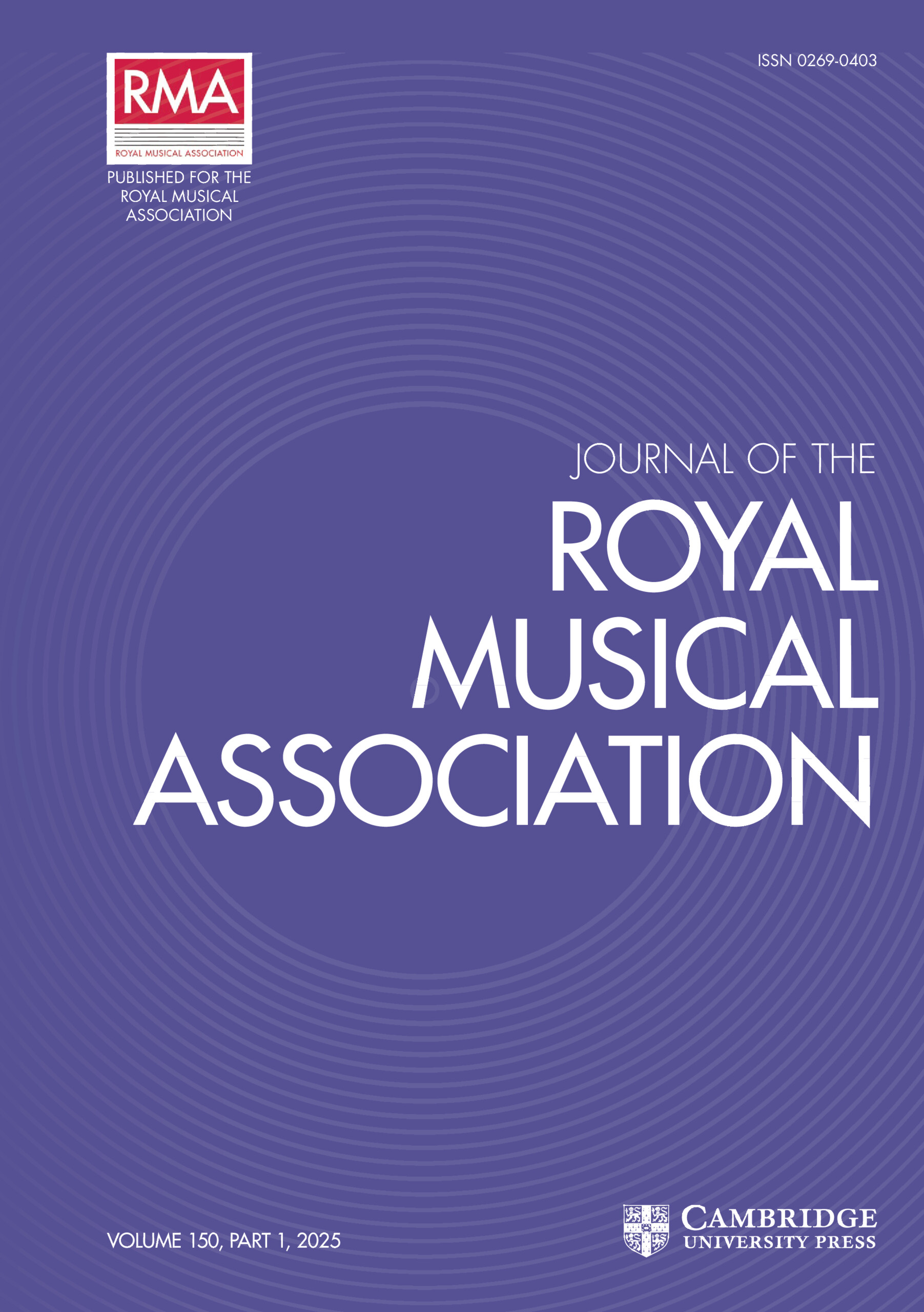No CrossRef data available.
Article contents
Round Table: Score Revisions Post-Première
Introduction
Published online by Cambridge University Press: 16 May 2022
Abstract

- Type
- Roundtable
- Information
- Copyright
- © The Author(s), 2022. Published by Cambridge University Press on behalf of The Royal Musical Association
References
1 ‘You can revise of course, but revising is always for me an unsatisfactory experience, unless it’s just the correcting or perfecting of little things. I feel like I’m revising a diary, changing what was the truth at the time. I feel quite squeamish about it. I don’t find it easy to make a flawed piece into a good one, and think it’s probably better to just listen to the flawed version.’ Judith Bingham, quoted in Stephen Farr, ‘The Solo Organ and Harpsichord Works of Judith Bingham’ (Ph.D. dissertation, University of Surrey, 2014), 68.
2 The literature relating to Handel’s borrowing and revisions is extensive. See Taylor, Sedley, The Indebtedness of Handel to Works by Other Composers: A Presentation of Evidence (Cambridge: Cambridge University Press, 1906)Google Scholar; Buelow, , ‘The Case for Handel’s Borrowings: The Judgement of Three Centuries’, Handel: Tercentenary Collection, ed. Hicks, Anthony and Sadie, Stanley (Basingstoke: Macmillan, 1987), 61–82 CrossRefGoogle Scholar; and Taruskin, Richard, ‘Borrowing’, The Oxford History of Western Music, 6 vols. (Oxford: Oxford University Press, 2005)Google Scholar, ii: Music in the Seventeenth and Eighteenth Centuries, 327–40.
3 Burrows, Donald, Handel: Messiah (Cambridge: Cambridge University Press, 1991), 32–46 CrossRefGoogle Scholar.
4 Glenn Gould, ‘A Tale of Two Marienlebens’, Das Marienleben (CD liner notes, Sony BMG, B001UC189E, 1978, 1995), repr. in The Glenn Gould Reader, ed. Tim Page (New York: Alfred A. Knopf, 1984), 151–63; Robin Holloway, ‘Corrective to a Fault’, The Spectator, 27 March 2010. See also Desbruslais, Simon, The Music and Music Theory of Paul Hindemith (Woodbridge: Boydell & Brewer, 2018), 177–221 CrossRefGoogle Scholar. It should be noted that one of the points for antagonism in Hindemith’s revisions was its basis in a theory, which ran against the grain of more abstract artistic endeavour.
5 Dodds, Julian, Works of Music: An Essay in Ontology (Oxford: Oxford University Press, 2007), 55–6CrossRefGoogle Scholar. See also Scruton, Roger, The Aesthetics of Music (Oxford: Clarendon Press, 1997)Google Scholar for a discussion of the concept of ‘variants’.
6 Clare Hammond, ‘To Conceal or Reveal: Left-Hand Pianism with Particular Reference to Ravel’s Concerto pour la main gauche and Britten’s Diversions’ (Ph.D. dissertation, City University London, 2012), 152–3. See also Georg Predota, ‘Badgering the Creative Genius: Paul Wittgenstein and the Prerogative of Musical Patronage’, Empty Sleeve: Der Musiker und Mäzen Paul Wittgenstein, ed. Suchy, Irene (Innsbruck: Studienverlag, 2006), 71–102 Google Scholar.
7 Glenn Gould retired from live performance to focus on recording, precisely because he wanted the privilege to revise: ‘The most creative artists are able to tinker and to perfect’ (The Glenn Gould Reader, ed. Page, xxi).




